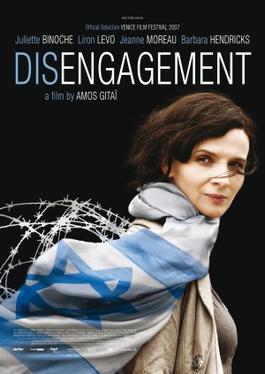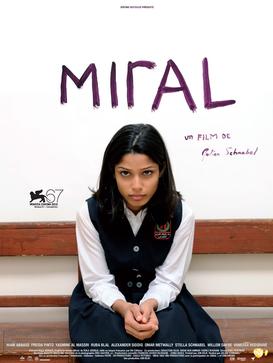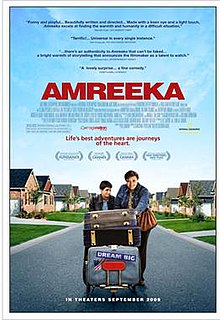
Hiam Abbass, also spelled Hiyam Abbas, is an Israeli and French actress and film director. She is known for her roles in films such as The Syrian Bride (2004), Paradise Now (2005), Free Zone (2005), Munich (2005), The Visitor (2007), Lemon Tree (2008), Insyriated (2017), and Blade Runner 2049 (2017). She gained prominence for her role as Marcia Roy in the HBO drama series Succession (2018–2023). She has also acted in the Channel 4 series The Promise (2011), the Lifetime miniseries The Red Tent (2014), the Hulu comedy series Ramy (2019–present), and the Hulu drama series The Old Man (2022).

Disengagement (Désengagement) is a film directed by Amos Gitai, starring Juliette Binoche, with Jeanne Moreau in a supporting role. The film is a French/Italian/Israeli co-production, and was shot in France, Germany and Israel. It is the third film of Gitai's "Border" or "Frontier" trilogy.
Cherien Dabis is an American actress, director, producer, and screenwriter. She was named one of Variety magazine's 10 Directors to Watch in 2009, and in 2010 received a United States Artists (USA) Fellowship. In 2022, she was nominated for the Outstanding Directing For A Comedy Series award for her work on the television series Only Murders in the Building. In March 2022, Dabis was named Laureate for Cultural Excellence by the TAKREEM foundation, for her work on authentic Arab representation in Hollywood.

The Visitor is a 2007 American drama film written and directed by Tom McCarthy and produced by Michael London and Mary Jane Skalski. Executive producers were Jeff Skoll and Omar Amanat. The screenplay focuses on a lonely man in late middle age whose life changes when a chance encounter with an immigrant couple forces him to face issues relating to identity, immigration, and cross-cultural communication in post-9/11 New York City.

The 62nd Cannes Film Festival was held from 13 May to 24 May 2009. French actress Isabelle Huppert was the President of the Jury. Twenty films from thirteen countries were selected to compete for the Palme d'Or. The awards were announced on 23 May. The film The White Ribbon, directed by Michael Haneke won the Palme d'Or.

Dawn of the World is a feature film written and directed by the Iraqi-French film director Abbas Fahdel.

Lemon Tree is a 2008 Palestinian drama film directed by Eran Riklis and co-directed by his cousin Ira Riklis. It stars Hiam Abbass, Ali Suliman, Danny Leshman, Rona Lipaz-Michael, Tarik Kopty, Amos Lavi, Lana Zreik and Amnon Wolf. The film describes the legal efforts of a Palestinian widow to stop the Israeli Defense Minister, her next door neighbor, from destroying the lemon trees in her family farm. At the same time, she develops a human bond with the minister's wife.
Haifa is a 1996 Palestinian drama film directed by Rashid Masharawi. It was screened in the Un Certain Regard section at the 1996 Cannes Film Festival.

Miral is a 2010 biographical political film directed by Julian Schnabel about the coming of age of a Palestinian girl named Miral who grows up in the wake of the 1948 Arab–Israeli War and finds herself drawn into the conflict. The screenplay was written by Rula Jebreal, based on her novel of the same name. The film was released on 3 September at the 2010 Venice Film Festival and on 15 September 2010 in France. The film was set for release on 3 December 2010 in the United Kingdom, and on 25 March 2011 in the United States. Miral was initially rated R by the MPAA for "some violent content including a sexual assault." Later, however, it was reclassified to PG-13 for "thematic material, and some violent content including a sexual assault" after an appeal of the R rating by the Weinstein Company.
The winners of the 10th Vancouver Film Critics Circle Awards, honoring the best in filmmaking in 2009, were announced on January 11, 2010.
Nisreen Faour is a Palestinian actress from the village of Ma'alot-Tarshiha, best known for her role as Muna in the 2009 American film, Amreeka.

The 33rd annual Cairo International Film Festival was held from November 10 to November 20, 2009. Indian director Adoor Gopalakrishnan was the President of the Jury.
Make a Wish (Intmanah) is a 2006 Palestinian-American short film by Cherien Dabis. It tells the story of Mariam, an 11-year-old Palestinian girl who faces enormous obstacles buying a birthday cake. It premiered at the 2007 Sundance Film Festival and received a number of awards at other festivals. It was released on DVD as a short for Dabis' 2009 feature film, Amreeka.

The DC Palestinian Film and Arts Festival (DCPFAF) is a non-profit, volunteer-run annual film festival established in 2011 that showcases the work of Palestinian filmmakers and artists in Palestine and in diaspora, showcasing the range and complexity of Palestinian identities and narratives. The DCPFAF aims to bring together Washington, DC's various communities through art, catalyzing conversations about film, culture, and diaspora, utilizing the lens of Palestinian filmmakers as an entry point.
Sheikha Al-Zain Sabah Al-Naser Al-Sabah also Al-Zain S. Al-Sabah is the Ambassador of Kuwait to the United States.

Yussuf Abu-Warda is an Arab-Israeli Maronite actor. A leading actor from 1999 he was head of Al-Midan Theater in Haifa.
Red Satin also known as Satin Rouge is a 2002 Tunisian Arabic-language women oriented drama film written and directed by Raja Amari on her feature film directorial debut. The film stars Palestinian actress Hiam Abbass and Hend El Fahem in the lead roles. It reveals the story of a widow woman who radically transforms from a housewife to a seductive caberet dancer. The film had its theatrical release on 24 April 2002 and opened to mixed reviews. The film received several awards and nominations at International Film Festivals.

Darine Hotait is an American film director and writer of Lebanese descent. She is best known for her short films, I Say Dust, Like Salt, Tallahassee, and Sherman.
Kareem Roustom is a Syrian-American composer, music director, and university teacher, noted mainly for his compositions of contemporary classical music, film scores and his collaboration with pop music artists. Among other musical ensembles, his compositions have been performed by the BBC Symphony Orchestra, the Boston Symphony Orchestra, the New York Philharmonic Orchestra and at festivals in the U.S., the Middle East and in Europe.
Bye Bye Tiberias is a 2023 internationally co-produced documentary film directed by Lina Soualem. It follows Hiam Abbass who leaves her Palestinian village, to pursue her dream of becoming an actress, leaving behind her mother, grandmother, and sisters. Abbass returns to her village, with her daughter, Soulaem, to explore her mother's choices, and family influence.











